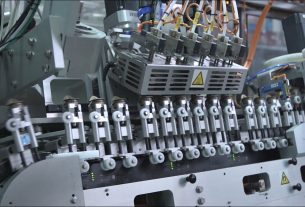In today’s complex supply chains, keeping track of food is vital in order to safeguard public health and maintain consumer confidence.
Food traceability plays a crucial role in enhancing food safety by maintaining detailed records of raw materials, suppliers and final product deliveries. Automation significantly supports this process by reducing errors, ensuring optimal storage conditions and integrating with information systems for easy data access. Cimcorp’s solutions exemplify how automated logistics systems can enhance traceability to ensure food safety, quality and consumer confidence.
“Automation in food distribution not only reduces errors and enhances safety,” explains Heli Kulmala, Head of Group QHSE at Cimcorp Group, “but also builds trust and cooperation among stakeholders by providing accurate and accessible information throughout the supply chain.”
Boosting quality, trust and sustainability
Traceability delivers benefits for grocery retailers, end customers and the planet. For grocery retailers, a robust food traceability system is essential for ensuring product quality and safety. By understanding product origins and ensuring proper storage conditions, retailers can uphold high standards and attract consumers in a competitive market. In addition, a traceability system optimizes operations by enhancing inventory control – improving operational efficiency and reducing waste – and enabling quick product recalls. Meeting legal obligations is another key benefit, as accurate record-keeping not only fulfills regulatory requirements but also boosts consumer trust.
End customers benefit significantly from traceability, enjoying enhanced safety and superior food because it ensures that products meet safety standards and are of high quality. Such a system also offers transparency and increases trust by providing insights into food origins and processing, which empower informed purchasing decisions. “Traceability supports consumers in ethical decision making, as they can choose products that are sustainably and ethically sourced,” emphasizes Heli Kulmala.
Globally, food traceability promotes sustainable resource management, as it helps companies identify ways to reduce waste and conserve resources. It ensures that food products come from farms that employ sustainable and ethical practices, and it encourages consumers to make environmentally and socially conscious purchasing choices.
Tech-driven safety: how automation is transforming food traceability
Automation enhances food traceability by reducing errors, optimizing supply chains and ensuring high quality. It ensures consistent quality by maintaining required storage conditions and controlling product movements, and supports sustainability by cutting energy use and minimizing waste. Technology and software enable effective labeling, accurate tracking and data analysis, further improving supply chain efficiency.
“By integrating advanced automation into food traceability systems,” says Kari Miikkulainen, Director of Warehouse & Distribution Sales at Cimcorp Group, “we not only enhance the efficiency and accuracy of the supply chain, but also uphold the highest standards of food safety. This technology ensures that every step – from farm to store – is meticulously monitored and controlled, providing consumers with the freshest and safest products, while supporting sustainable and ethical practices. By investing in advanced traceability systems, the food industry can provide significant benefits for retailers, customers and the global community.”






